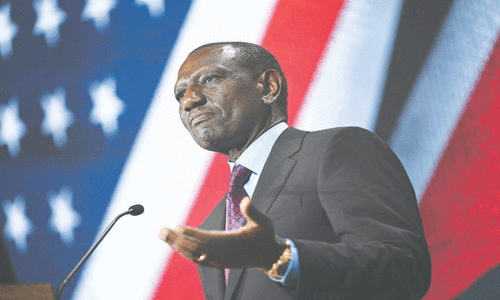WASHINGTON, May 20: US Defence Secretary Robert Gates rebuffed calls for diplomatic engagement with Iran on Tuesday, saying it was an open question whether talks would be productive while President Mahmoud Ahmedinejad is in power.
Gates said the United States may have missed an opportunity to engage Iran in 2003 to 2004, but Iran under Ahmedinejad has experienced “a resurgence of the original hardline views of the Islamic revolutionaries.”
“So the question is do you have the kind of government in Iran now with whom there can be productive discussions on substantive issues, and I think that’s an open question,” he told the Senate Appropriations Committee.
Gates came under sharp questioning from Republican Senator Arlen Specter about the administration’s refusal to reach out diplomatically to Iran and its insistence that Tehran must first halt its uranium enrichment programme.
The issue arose last week when President George W. Bush told the Israeli Knesset that negotiations with “terrorists and radicals” amounted to “appeasement,” sparking an angry response from Democratic presidential hopeful Barack Obama.
On the same day, Gates appeared to depart from the White House position in a talk with a foreign policy group that seemed to advocate creating a combination of incentives and pressures on Tehran to gain leverage for negotiations.
But Gates told lawmakers on Tuesday that he believed stepped up pressure on Tehran was the way to gain leverage.
“I think the key here is developing leverage either through economic, or diplomatic or military pressures on the Iranian government so they believe they must have talks with the United States because there is something they want from us, which is the relief from the pressure,” Gates said.
But Spector questioned the US approach.
“Isn’t it sensible to engage in discussions with somebody to find out what it is they are after? We sit apart from them and we speculate,” the senator from Pennsylvania said.
Gates, who once advocated talks with Tehran, said there may have been a missed opportunity in 2003 and 2004 in the immediate aftermath of the US invasion of Iraq when the more moderate Mohammed Khatami was president of Iran.
“At a time when we had overthrown the Taliban, and when we had overthrown Saddam Hussein, the Iranians were clearly very worried about what we would do next in 2003-2004,” he said.—AFP














































Dear visitor, the comments section is undergoing an overhaul and will return soon.